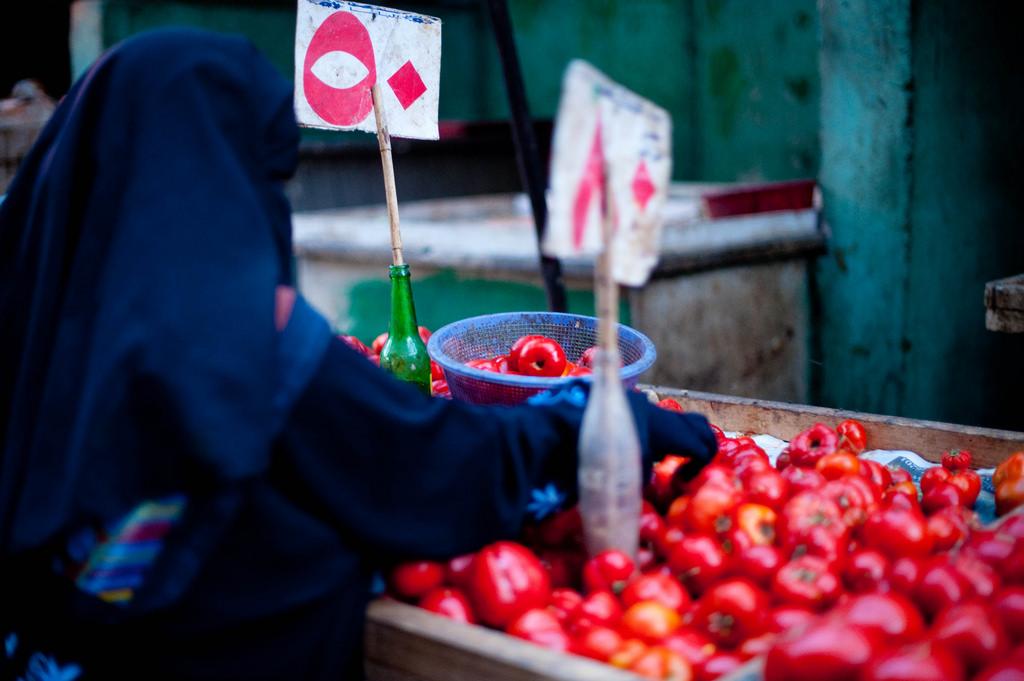The Agricultural Models We Want Tomorrow
How food waste is driving up living costs in MENA and how innovative inclusive business can reduce it

by Nazila Vali, Business Call to Action Knowledge & Partnerships Lead
Rana, 45-year-old Egyptian mother of three, sells her vegetables on a wooden cart at the side of a dusty and bustling road in the heart of the Sayeda Zeinab district of Cairo. She stands there from sunrise to sunset every day to earn enough money to feed her children. Despite a relatively steady flow of customers, Rana’s income is both meagre and uncertain. Fresh vegetable prices have shot up by 34 percent since January.[1] Squeezed by tough times, with rising inflation, every one of the supply chain links – from the farmer to the multiple layers of traders to the grocer and the buyer – is battling to do more with less.
In Egypt - as in the whole North Africa and the Middle East (MENA) region - a sizeable portion of produce never even makes it off the farms due to the poor farming techniques. More is damaged during transport and ends up being thrown away or sold cheaply to factories to produce value-added goods such as tomato paste. The short shelf life of vegetables and delays caused by transport issues limits the window of time available to Rana to sell her products and turn a modest profit.[2]
Food loss in the supply chain, the shift to a less-nutritious fast-food diet and wasteful irrigation techniques are among the most important challenges currently facing the food and agriculture system in the region. In Egypt, 2.5 million tonnes of wheat is lost per year mainly due to slow transit times. For fruits and vegetables, which have the highest proportion of losses and waste, estimated at 45 percent, country specific data indicates a substantial part (as high as 29 percent for fresh vegetables in Egypt) of these losses occur at the post-harvest stage.[3] However, these losses between the grower and consumer along the value chain can be avoided.
With an estimated 20 million people living in Cairo – more than the populations of Libya, Lebanon and Jordan combined – innovative approaches are desperately needed to transform the country’s inefficient agriculture system into a system that caters for the needs of the entire population, including those living at the Base of the Economic Pyramid (BoP).
The UN Global Goals agenda proposes meeting these challenges by shifting the food and agriculture system onto a sustainable development pathway. The recently published Better Business, Better World MENA Report puts a price tag on the economic opportunities if the entire region pursues a more inclusive, sustainable pathway, as outlined by the SDGs: by 2030, for the food and agriculture value chain alone, disruptive business opportunities could be worth more than US$92 billion per year.
This presents a range of interesting investment opportunities, from innovative transport systems to data systems that better manage production processes and investment in cold-storage facilities. Ways to turn these losses into profit include the use of active smart packaging for perishables, better packaging, and tapping into secondary markets for lightly damaged food items. Cost concerns and growing consumer awareness, pushed by increasing sustainability reporting requirements for food retailers, will favour the development of low-waste food processors. Evidence demonstrates that developing low-cost storage techniques and handling practices can reduce food loss by over 60 percent and increase smallholder farmer’s income by more than 30 percent.[4]
Business Call to Action’s (BCtA) companies are already tapping into some of the opportunities listed above, and can serve as positive examples for inclusive businesses in the MENA region. In Sub-Saharan Africa, Equator Kenya is actively working to increase smallholder farmers’ productivity in Kenya through a technology package for irrigation, bio pesticides and fertilizer blends, which results in higher produce yields. In El Salvador, Acceso, a social business that improves the livelihoods of farmers, is building a strong inclusive value chain that benefits from economies of scale, logistics efficiencies and optimized quality management tailored to buyers’ needs.
There is much more than billions in value at stake; by finding innovative ways to improve the efficiency of the food and agriculture sectors, there are huge opportunities to shape a safer and more prosperous future for MENA’s young and dynamic population. Across the region, inspiring innovations are driving agricultural productivity and increasing participation. By pushing business leaders to lead the charge for sustainable growth and supporting them tackle the challenges they face along the way, we can reach a better world.
Nazila Vali is the Knowledge & Partnerships Lead at the Business Call to Action, UNDP Istanbul International Center for Private Sector in Development. She contributed to "The Private Sector’s Role in Implementing the Sustainable Development Goals” Regional Conference held in Cairo on December 4-5, 2017. The conference jointly organised by the American Chamber of Commerce (AmCham) Egypt, the United Nations Development Programme and the Business & Sustainable Development Commission launched the Better Business, Better World MENA report.
